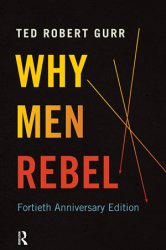
Автор: Ted Robert Gurr
Название: Why Men Rebel
Издательство: Routledge
Год: 2011
ISBN: 1594519145
Язык: English
Формат: epub, pdf
Размер: 22,9 mb
Страниц: 440
Why Men Rebel remains highly relevant to today's violent and unstable world with its holistic, people-based understanding of the causes of political protest and rebellion. With its close eye on the politics of group identity, this book provides new insight into contemporary security challenges.
INTRODUCTION TO NEW PAPERBACK EDITION
INTRODUCTION
1. EXPLANATIONS OF POLITICAL VIOLENCE
What Is to Be Explained?
Toward an Integrated Theory of Political Violence
The Nature of Social Theory
2. RELATIVE DEPRIVATION AND THE IMPETUS TO VIOLENCE
Relative Deprivation Defined
The Sources of Aggression
Relative Deprivation and Analogous Causes of Political Violence
Patterns of Relative Deprivation
The RD Models: Some Qualifications and Uses
3. THE INTENSITY AND SCOPE OF RELATIVE DEPRIVATION
Determinants of Intensity: The Degree of Relative Deprivation
Determinants of Intensity: Value Salience
Determinants of Intensity: Number of Opportunities
Some Effects of Anticipation and Persistence of RD
Determinants of the Scope of Relative Deprivation
4. SOCIAL ORIGINS OF DEPRIVATION: SOURCES OF RISING EXPECTATIONS
Demonstration Effects: Exposure to New Modes of Life
Demonstration Effects: New Ideologies
Demonstration Effects: Value Gains of Reference Groups
Demonstration Effects: Value Disequilibria
Some Effects of Value Mobility
5. SOCIAL ORIGINS OF DEPRIVATION: DETERMINANTS OF VALUE CAPABILITIES
General Determinants of Value Capabilities
Welfare Value Capabilities and Political Violence
Interpersonal Value Capabilities and Political Violence
Power Values and Political Violence
6. PERSPECTIVES ON VIOLENCE AND POLITICS: SOCIALIZATION, TRADITION, AND LEGITIMACY
Two Basic Hypotheses
Psychocultural Justifications for Violence
The Politicization of Discontent
The Legitimacy of Political Systems
7. PERSPECTIVES ON VIOLENCE AND POLITICS: IDEOLOGIES, UTILITIES, AND COMMUNICATION
Doctrinal Justifications for Political Violence
The Utility of Violence
The Communication of Aggressive Symbols
Summary
8. THE COERCIVE BALANCE
The Balance of Regime and Dissident Coercion
Regime Coercion
A Note on Rational Conflict Models Negative Sanctions
Dissident Coercion
9. THE BALANCE OF INSTITUTIONAL SUPPORT
The Balance of Regime and Dissident Institutional Support
Some Structural Determinants of Institutional Support
Some Functional Determinants of Institutional Support
Instrumental vs. Expressive Functions of Associational Groups
10. CAUSES AND PROCESSES OF POLITICAL VIOLENCE: A CONCLUSION
Determinants of the Magnitude of Political Violence: A Summary
Determinants of the General Forms of Political Violence
Processes of Political Violence
Conclusion
Appendix: summary list of hypotheses and corollaries
Bibliography
I. Behavioral and Attitudinal Studies
II. Studies of Group Conflict and Political Violence
Index
|